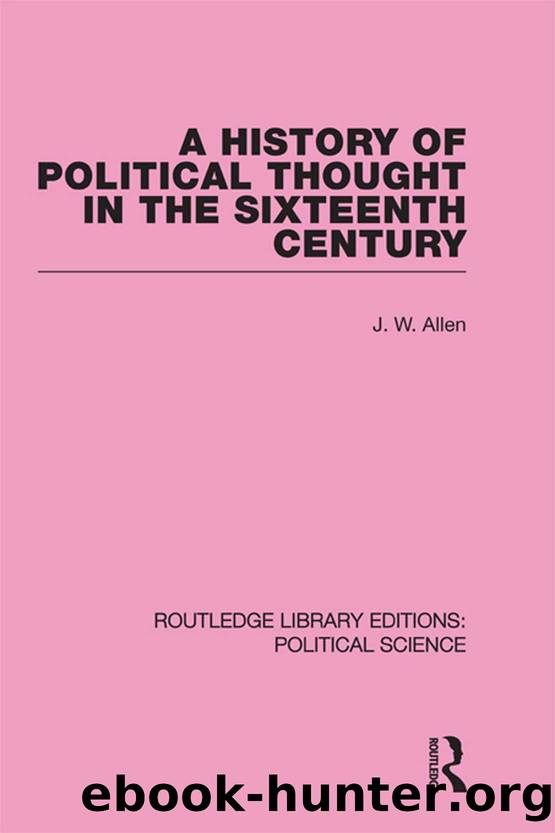A History of Political Thought in the 16th Century by J. W. Allen

Author:J. W. Allen [Allen, J. W.]
Language: eng
Format: epub
Tags: Politics, Political Science, General
ISBN: 9781135026936
Google: uXkUePiRFxQC
Goodreads: 18182325
Publisher: Routledge
Published: 1928-09-20T00:00:00+00:00
§ 4. DOLEMAN: AND HAYWARD AND CRAIG
It is a fact that Hayward and Craig agreed far more with their adversary, Doleman, than they did with King James. âDolemanâ, or Robert Parsons, like Hooker, laid down2 that it was man's natural sociability, added to his feebleness in isolation, that had driven him to create and to accept authority. The institution of government arose inevitably and being from nature is from God. So far he was in fairly exact agreement with Craig and Hayward. But he asserted that no particular form of government was specially of divine institution. âThese particular forms are left unto every nation and country to choose that form of government which they shall like best and think most meet for the natures and conditions of their people.â1 Here, verbally at least, he parts company with them: for they wished to have it both ways. Monarchy, Doleman declared, has been proved by experience to be the best form of government; but the powers of the monarch should always be limited by law, as in fact they are in England. England is a âmixedâ monarchy. In this, in spite of his talk about the institution of monarchy by God, Craig agreed with Doleman.
What has to be kept in mind, Doleman argued, is that Kings exist at all, solely for the welfare of their subjects. That being so, if a King do not respect the laws of his monarchy or observe the implied conditions on which his authority is held, he may lawfully be deprived of his crown, âupon just and urgent causes and by public authority of the whole bodyâ.2 It is merely absurd to say that authority having been delegated to a King, the people can have no right to take it from him. A commonwealth exists âfor justice and orderâ: and no delegation of authority can rationally be conceived except as having strict reference to those ends: The assertion that a King may always do as he wills and that the very property of his subjects really belongs to him, âoverthroweth the whole nature of a commonwealth itselfâ.3 If a Prince, he concluded, do not govern religiously, equitably and lawfully, not only may he be deposed but evidently for the salvation of the commonwealth, he ought to be.4 The same principles apply to the heir to a crown. Laws of succession vary from country to country; and that fact alone proves that all laws of succession are of merely human origin. No mere law of succession, therefore, can give to anyone an absolute right to succeed. Religion being the most important of all considerations, the lack of religion in an heir at law is the best possible ground for excluding him from succession. For âno reason or law, religion or wisdom in the world can admit such persons to the government of a commonwealth by whom no good but destruction may be expected to the sameâ.5
There is far less difference between the views of Doleman and those of Craig or of Hayward than either of the latter were willing to admit.
Download
This site does not store any files on its server. We only index and link to content provided by other sites. Please contact the content providers to delete copyright contents if any and email us, we'll remove relevant links or contents immediately.
The Secret History by Donna Tartt(19088)
The Social Justice Warrior Handbook by Lisa De Pasquale(12190)
Thirteen Reasons Why by Jay Asher(8909)
This Is How You Lose Her by Junot Diaz(6886)
Weapons of Math Destruction by Cathy O'Neil(6279)
Zero to One by Peter Thiel(5801)
Beartown by Fredrik Backman(5754)
The Myth of the Strong Leader by Archie Brown(5507)
The Fire Next Time by James Baldwin(5444)
How Democracies Die by Steven Levitsky & Daniel Ziblatt(5218)
Promise Me, Dad by Joe Biden(5153)
Stone's Rules by Roger Stone(5087)
A Higher Loyalty: Truth, Lies, and Leadership by James Comey(4962)
100 Deadly Skills by Clint Emerson(4925)
Rise and Kill First by Ronen Bergman(4788)
Secrecy World by Jake Bernstein(4753)
The David Icke Guide to the Global Conspiracy (and how to end it) by David Icke(4717)
The Farm by Tom Rob Smith(4507)
The Doomsday Machine by Daniel Ellsberg(4490)
